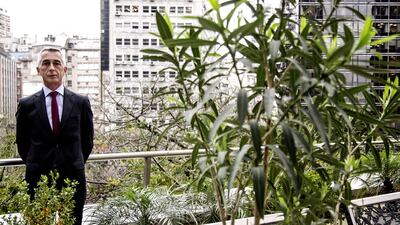Martin Denari was made Orange Business Services global director of the company's industry sector focused on oil, gas and mining last month. In this job, he oversees the supply of IT infrastructure and communication services to exploration and production companies. He is based between Paris and Houston.
Is your background in telecoms, or in oil and gas?
Both. I have worked for the oil and gas industry for more than 10 years. I worked for Halliburton and Schlumberger. And I worked for T-Systems.
Why were you brought in to do this job?
Orange has been successful in selling products into oil and gas markets for the past few years – mainly from an opportunistic standpoint. [Management realised] this was not a coincidence. As a strategic decision they decided to formally create the oil and gas [industry sector]. Within our Orange portfolio worldwide, we recognised services and products that are particularly suitable for the pain points in the oil and gas industry. Every industry has what we call a pain point: something which is crucial for [the industry] to solve; something that’s not going to go away but with your solutions you are going to make it better.
So what are the pain points in oil and gas exploration?
The remoteness of the locations. What we do is somehow bridge that gap [of] remoteness with technology. The key word here is collaboration. There is another factor coming into the equation which makes remoteness even more complex, which is the ever-diminishing [number of experts] in the oil and gas industry. You still need experts to find oil. So how do you do that when you are a company that has wells all over the world? You cannot have these experts flying around the world to look at a measurement and say "yes, no, maybe". You need to be able to bring those people together to collaborate with each other in a seamless fashion, in a real-time, collaboration environment. That is what we are able to do today.
I imagine it wasn’t always like that.
Back in 1994, I was connecting a customer's headquarters to a well site. You had to be very careful with the type of data you chose to send over the service. You couldn't send large volumes of information. [There were] a lot of problems; the service would go down. Now you can basically set up a portable telepresence at the well site, another one at the office using VSAT connectivity and you cannot only have video conferencing but can send documents, screens, move data back and forth and it's been 15, 20 years only.
And what about your work regarding oil production?
Different issues surface here. When you have a production field you still need to closely monitor what is going on and this is done by implementing a technology called machine to machine. You need to be able to collect data from the different sensors out here in the field to track what’s going on at each well and make sure all the hardware, pipes, tubes, pumps, whatever it is, is working properly to make sure you are producing the optimum and maximum amount of oil from each well. You need to be able to monitor everything in real time to be able to make decisions. It’s not only a matter for production; it’s a matter of health and safety. You need to be able to shut down remotely a well if you detect a hazard that could turn into a fire.
So what does Orange provide that its competitors do not?
Few companies have the footprint we have. We are present in more than 220 countries. And we can go from a tiny thing like a cellphone to an offshore vessel that would lay subsea cables, fibre-optic cables to [link] your headquarters with your offshore platform.
Which regions geographically are you focusing on?
The Middle East is big, Africa is big, Russia is big, then Latin America, North America. The whole map of the oil and gas production world is changing as we speak because in the past we were only talking about conventional oil and gas and now we bring into the picture enhanced recovery, shale oil, shale gas. We do have customers already here [in the Middle East] and we plan to have more. The Middle East is the eastern oil and gas capital for the world as Houston is for the West.
Final thoughts?
I think we can really bring value to the industry. When you get a decision that allows you to contribute somehow not only to financial results but to an industry it’s very fulfilling.
lgutcher@thenational.ae

